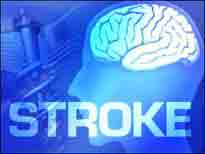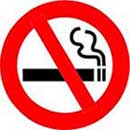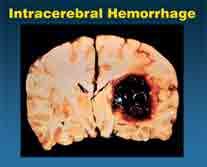|
Stroke SymptomsIs it possible to prevent a stroke?age-well.org > prevent age related diseases > stroke symptoms What is a brain attack?
A stroke or "brain attack" is a very serious condition which kills over 80 percent of and leaves two thirds of survivors with some degree of disability from minor problems such as a weakness in one of their members to complete paralysis of one side of the body and loss of speech. The brain attack may happen because an artery or blood vessel becomes blocked by a blood clot, preventing oxygen being carried to part of the brain. When this happens the brain cells in this area of the brain die and brain damage occurs. This is known as an Ischemic stroke.
When bleeding occurs in the space that lies between the brain and the skull this is referred to as a subarachnoid hemorrhage or haemorrhage (British Spelling) and is often caused by a burst aneurysm (like a hernia in the blood vessels in the brain). Bleeding within the brain tissue is called an intracerebral hemorrhage and is often caused by hypertension. The ability to control areas of the body that are activated by that area of the brain is lost when brain cells die due to an attack. These abilities include speech, movement and memory. The effect of the damage depends on where the attack occurs in the brain and how much of the brain is damaged. Therefore, someone who experiences a small brain attack may escape with only minor problems whereas someone who has a major attack may find themselves confined to a wheelchair and unable to speak.
How do you know if you are having a stroke?Symptoms of a Brain Attack There are several warning signs that may mean you are having an attack. If you experience any of these you need to consult your doctor or emergency services immediately. The major symptoms include the following:
These symptoms usually come on suddenly with no warning. Emergency assistance is imperative, so call an ambulance, especially if you live alone.
Reducing the Risks



There are several risk factors which we do not have any control over, including age, gender, race and heredity factors, as well as some other health conditions which can increase your risk of having a brain attack. However, there remains much that can be done to dramatically reduce your risk. The major things we can do are outlined below. However, if you think you might be at risk it is advisable to seek medical advice. Get advice from your doctor on lowering your risk.Know the symptoms (above) and if you experience any, get help right away. Top Ten Things You Can Do to Reduce Your Risks 1. Lower your blood pressure.
Treating a StrokeSpeed is of the upmost importance when treating a stroke ,which is why there are various campaigns to make people aware of the symptoms. A fast response for treating the brain attack has been known to almost reverse the effects. But for this to happen, the treatment has to be given within a few hours after the symptoms appear. Upon admission to hospital the patient will be given a CAT scan and treatment will depend on the type of attack and the length of time when it occurred. The long-standing outcome depends on the severity and how much impairment was caused to the brain. The patient will have to work hard with a physiotherapist as well as a speech therapist to recover the abilities lost and to regain the possibility of participating in all the activities that were accomplished prior to when the attack happened. Long-term rehabilitation can take months or even years and measures should be taken to prevent depression and to keep a positive outlook. Cross Heart Attack and Stroke Off Your List of Things to Worry About… Once you have your first stroke or heart attack, your chances of another are very high. But they don’t have to be! You can get rid of the most common cause of heart attack with a remedy that costs just pennies. And it’s available at your local grocery store. Beat these killers and put the worry out of your mind for good. I’m Al Sears, M.D. and I’ve seen it work countless times. Over the last 20 years, I’ve treated hundred of stroke victims. But when I give them this simple preventative cure, they go on to live happy and productive lives – without the fear of having another stroke. Find out how you can get the same protection… age-well.org > prevent age related diseases > stroke symptoms Top of Stroke Symptoms |
Translate this Site
Search this Site
List of Conditions
|
Alcoholic Liver
|
|
Alzheimers Disease
|
|
Arterioslerosis
|
|
Age-Related Cancer
|
|
Cataracts
|
|
Cholesterol
|
|
Colds and Flu
|
|
Depression
|
|
Diabetes
|
|
Dementia
|
|
Dry Eye
|
|
Enlarged Prostate
|
|
Fibromyalgia
|
|
Glaucoma
|
|
Hair Loss
|
|
Halitosis
|
| Heart Attack
|
| Herniated Disc
|
|
High Blood Pressure
|
|
Incontinence
|
|
Influenza
|
|
Lower Back Pain
|
|
Macular Degeneration
|
|
Menopause
|
|
Osteoarthritis
|
Osteoporosis
|
|
Parkinson's Disease
|
|
Peri-Menopause
|
|
Presbycusis
|
|
Presbyopea
|
|
Prediabetes
|
|
Sarcopenia
|
|
Stroke
|
|
Shingles
|
|
Swineflu
|
Develop Smart Habits
|
Lose Extra Weight
|
|
Lose Bellyfat
|
|
Quit Smoking
|
|
Reduce Alcohol
|
|
Get Enough Sleep
|
|
Eat Healthily
|
|
Cut Down on Salt
|
|
Cut down on sugar
|
|
Avoid Transfats
|
|
Follow the DASH Diet
|
|
Drink Plenty of Water
|
|
Exercise Regularly
|
|
Manage Stress
|
|
Get Your 5 a Day
|
| Eat a Healthy Breakfast
|
|
Get Enough Calcium
|
|
Practice Good Oral Hygiene
|
|
Think Positive
|
Healthy Digestion
|
The Digestive System
|
|
The Intestines
|
|
Prevent Constipation
|
About this Site






 A brain attack can also be caused when a blood vessel in the brain breaks and bleeds into the brain. This is called a hemorrhagic stroke and accounts for 20 percent of all brain attacks. This causes cells to die, as they are no longer receiving nutrients and, above all, oxygen. Hemorrhagic attack is less common than Ischemic type but is more often fatal.
A brain attack can also be caused when a blood vessel in the brain breaks and bleeds into the brain. This is called a hemorrhagic stroke and accounts for 20 percent of all brain attacks. This causes cells to die, as they are no longer receiving nutrients and, above all, oxygen. Hemorrhagic attack is less common than Ischemic type but is more often fatal. 
